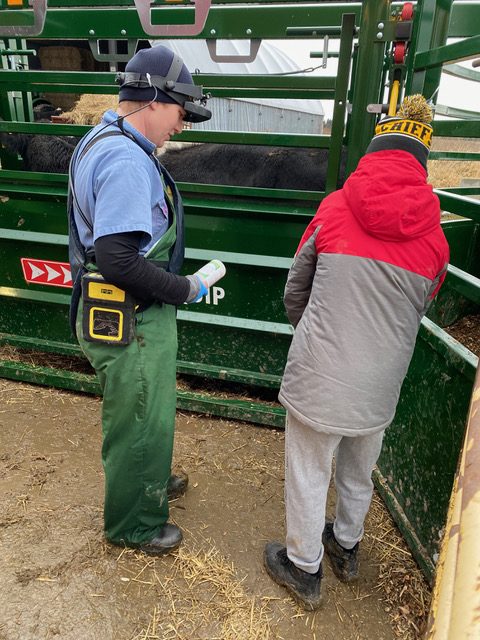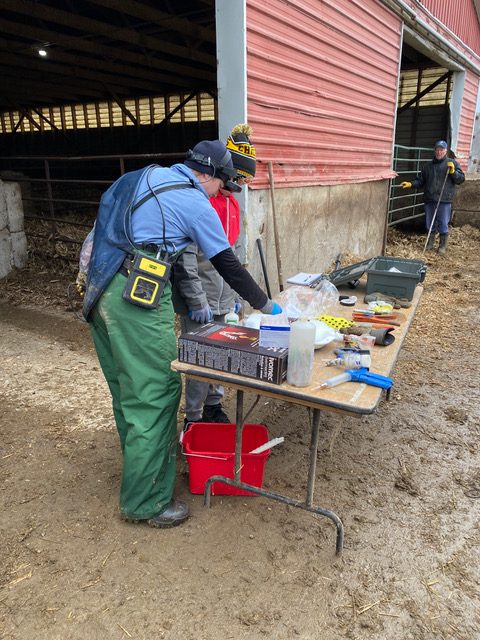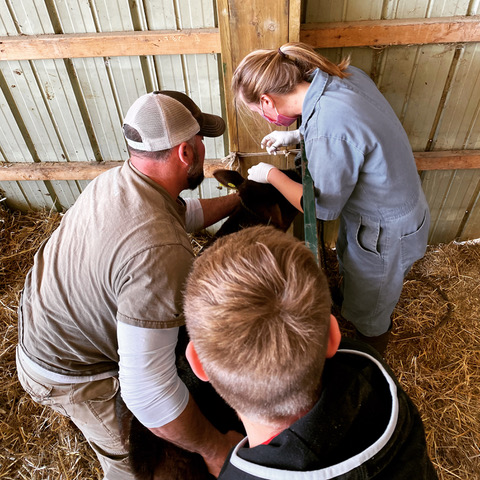Do you have a family doctor? Do you call your doctor whenever you feel crappy, when you have any aches, pains or ailments? Does your doctor prescribe medications to help cure your ailments or relieve your aches and pains?
A veterinarian is no different for cattle. It’s so so important to have a good working relationship with a veterinarian. To find a vet that you can get along with, that understands your herd, and your operation.
We have worked with and continue to work with some wonderful local veterinarians, Kirkton Vet Clinic. Always willing to pick up the phone to troubleshoot, give suggestions, and quick to diagnose. Never hesitant to ask another professional if they don’t have an immediate answer.
When we have an animal on the farm that isn’t feeling well or might be acting “off”, we are quick to assess it, to determine what’s bothering it just as we would do with our family. When our kids are down and out, feeling punky or out of sorts we start with the facts. Take the temperature, ask the questions, and begin to eliminate what it could be. Cattle are no different, with the exception that they can’t tell us when they aren’t feeling well, or what hurts. You have to know your herd, know their habits, personalities, and characteristics. You have to observe them daily, and watch for different behaviours. Things like their ears pointing down, not chewing their cud, laying away from the rest of the herd, circling, pawing at the ground, agitation, foam, drool, bloating, mucus, etc. There can be any number of things that cause those symptoms. Sometimes you can diagnose from previous experience and sometimes it requires a phone call or visit from the vet.
Much like us humans, we don’t want to watch an animal suffer. A veterinarian does what your family doctor will do. Test, evaluate, observe, ask questions, and then diagnose. Sometimes those diagnoses come with a treatment plan that includes a course of antibiotics or pain medication. A necessary measure to keep the animal both comfortable and provide it a fighting chance at survival.
Here’s what you need to know. When humans take a course of antibiotics those antibiotics don’t stay in your system for the rest of your life. Should you fall ill again you will likely require another dose of antibiotics to treat it. When we treat cattle, or any animals for that matter with antibiotics they will not stay in their system for the rest of their lives.
ALL meat is antibiotic free! As a producer we CAN NOT ship an animal for food consumption that has been treated with antibiotics, UNTIL it has gone through the proper withdrawal periods.
Thankfully we do not have to treat a lot of our animals, as we do have good farming practices in place that do keep them safe and healthy. However there are elements outside of our control, things such as the constantly changing climate which can be a perfect storm for pneumonia, c-sections due to difficult births, a pre-mature baby, a calf that has been stepped on and broken its leg, a critter hole in the pasture field that can cause a sore foot or leg, ingesting trash that someone has thrown out their window when driving by a pasture field, a twisted stomach requiring surgery. The list can go on, just as it can for human beings.
Things happen, veterinarians are there for our herds just as your family doctor is there to support yours.❤️

Rebecca taking the time to educate a helper on Herd Health day here at the farm. 
Jill removing the stitches after Jelly Beans eye surgery, while taking the time to explain to Wyatt.
Share this post


